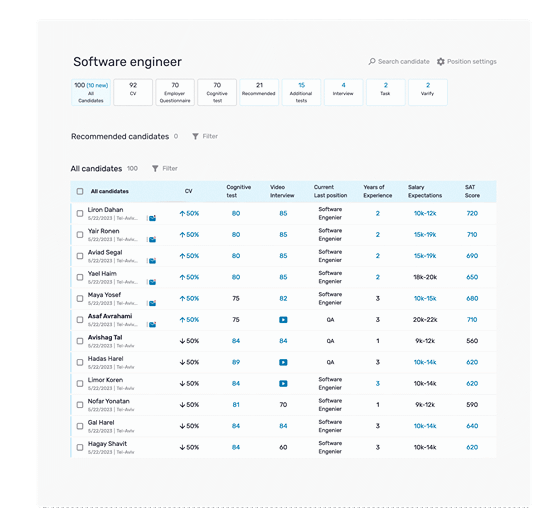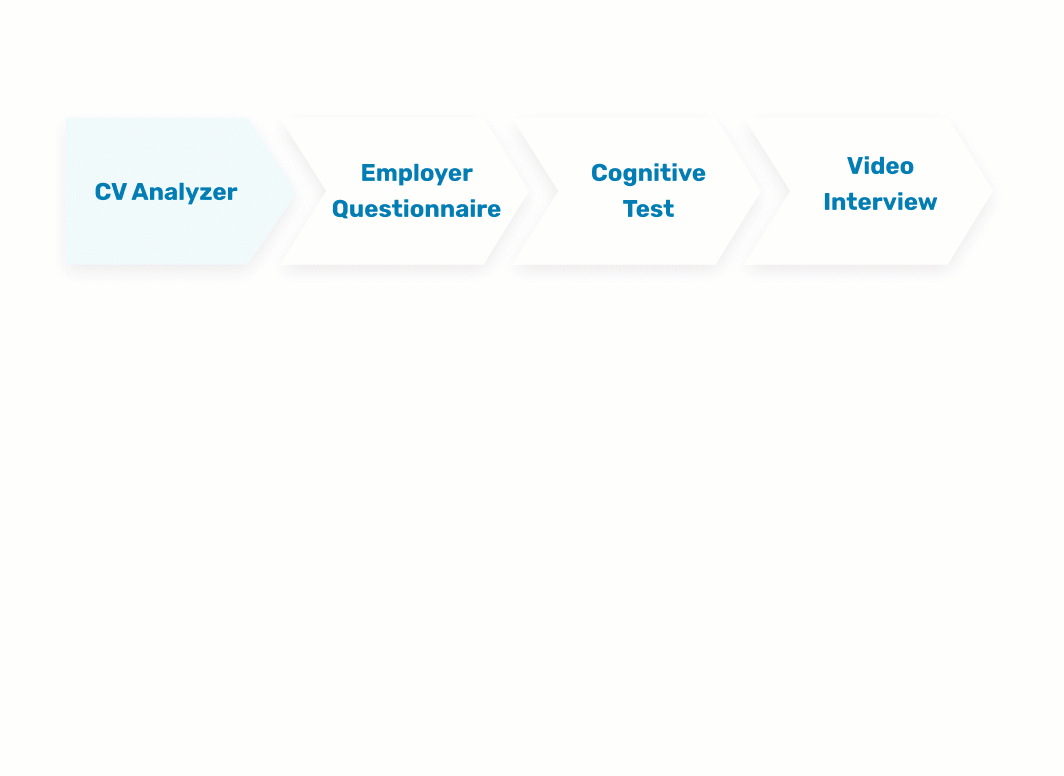 The Influence of AI Recruitment Tools on Today’s Hiring Process
The Influence of AI Recruitment Tools on Today’s Hiring Process
As HR professionals strive to secure top talent swiftly and efficiently, the complexity of the modern job market has made the hiring process more demanding. The challenges of navigating high turnover rates and overwhelming application volumes emphasize the need for advanced solutions. AI recruitment tools have emerged as a transformative force, reshaping recruitment strategies to enhance efficiency, offer actionable insights, and refine candidate matching processes.
This article explores the pivotal role of AI recruiting tools, their impact on the hiring process, and the ethical considerations surrounding their adoption.
The Role of AI Recruitment Tools
AI recruitment tools leverage machine learning, natural language processing (NLP), and predictive analytics to streamline recruitment workflows. These tools automate repetitive tasks, identify qualified candidates, and provide a data-driven foundation for hiring decisions.
- Machine Learning: Enables systems to learn and improve from data over time.
- Natural Language Processing (NLP): Understands and interprets human language.
- Predictive Analytics: Uses historical data to forecast future outcomes.
From manual resume screening to candidate sourcing on multiple platforms, the integration of AI tools like AI recruiting software and AI-powered sourcing platforms has streamlined the entire recruitment process for hiring teams and HR departments.
Enhanced Efficiency through AI Recruitment Tools
Automating Repetitive Tasks
AI recruiting tools automate the screening of resumes by scanning for job descriptions and specific keywords, allowing HR teams to focus on strategic decisions instead of tedious tasks.
Streamlining Communication
With built-in interview scheduling features, AI recruitment tools simplify logistics, facilitating better candidate engagement and ensuring timely interactions.
Accelerated Hiring Process
Through advanced algorithms, AI tools expedite the initial evaluation stages, significantly reducing the time to hire and enabling employers to identify top candidates efficiently.
Case Study: AI Recruitment Tools at Unilever
Unilever’s adoption of AI-powered recruiting tools revolutionized its hiring pipeline. By automating initial assessments and leveraging AI interviews, the company achieved a 75% reduction in hiring time. This integration highlighted how AI recruitment software enhances operational efficiency and improves the candidate experience.
Challenges and Ethical Considerations Using AI Recruiting Tools
While AI recruiting tools offer significant benefits, some challenges may include:
- Bias in AI: Addressing biases in data sets through diverse training data and active monitoring.
- Privacy and Data Security: Ensuring responsible handling of sensitive candidate information and compliance with data regulations.
- Balancing Automation with Human Judgment: Striking a balance between automation and empathy in hiring decisions to maintain a human touch.
Key Takeaways
Integrating AI recruitment tools into the hiring process has redefined how hiring teams and HR departments approach recruitment. These tools are essential for:
- Automating Manual Tasks: Reducing the burden of manual data entry and tedious tasks.
- Enhancing Candidate Sourcing: Expanding talent pipelines and improving candidate communication across social media platforms and career sites.
- Improving Decision-Making: Leveraging analytics capabilities to make informed choices.
By embracing AI recruiting tools, organisations can save time, optimise their hiring workflow, and build diverse, dynamic teams for long-term success.
When Human Meets AI: Integrating Our Recruitment System into Your Process
Now that we've reviewed all the reasons for integrating AI tools into your recruitment process let's talk about how!
Introducing AI Recruitment – the Noam Institute's recruitment system that combines artificial intelligence with your recruitment experience, changing the game for you, the recruiters, the role holders in your organisation, and the candidates. How does it work?
- Manage All Recruitment Processes in One Place: Publish job openings across relevant platforms with a single click and share the current status of all recruitment processes in your organisation via the dashboard. All role holders, recruiters, and managers have real-time access to candidate details, test results, reviews, and recommendations and can track the process's progress.
- Upgrade the Candidate Experience: Create a smooth and upgraded screening experience and offer full transparency about the recruitment process. This benefits the candidates, who know their status at any given moment, the recruiters, who significantly reduce the chance of missing a leading candidate or letting them fall through the cracks, and your organisation, which transforms the recruitment process into a well-organised, pleasant, and inviting business card.
- Take the Recruitment Process a Step Further: Integrate innovative features into your recruitment process, such as automating screening stages, AI-based CV scanning, custom cognitive assessments, and top candidate ranking. This minimises administrative tasks, saves time, and achieves better results.
- Reach the Best Candidates First: Receive all the data clearly and quickly and identify the leading and most suitable candidates even before the first phone call.
- Keeps AI-Human Balance: Using diverse data, AI Recruitment ensures privacy and security with strict measures, complying with data protection rules. To balance automation with human judgment, it integrates human oversight at crucial points, combining AI efficiency with the empathy and insight of human recruiters.


FAQs
An AI recruitment tool is a software solution that leverages artificial intelligence to enhance various aspects of the recruitment process. These tools use machine learning algorithms and data analytics to automate and optimize tasks such as sourcing candidates, screening resumes, assessing skills, and predicting candidate fit. AI recruitment tools can analyze large volumes of data to identify top candidates, reduce bias in hiring, and provide insights into recruitment trends. They also often offer features like chatbots for initial candidate interactions, automated scheduling, and advanced analytics to improve decision-making and efficiency in the hiring process.
An ATS (Applicant Tracking System) is not inherently an AI (artificial intelligence), but many modern ATS platforms integrate AI technologies to enhance their functionality. Traditional ATS systems focus on automating and organising the recruitment process, such as posting jobs, collecting resumes, and tracking candidates. However, advanced ATS platforms often incorporate AI to improve efficiency by using machine learning for resume screening, predicting candidate fit, automating initial interactions with chatbots, and providing predictive analytics to refine recruitment strategies. Thus, while an ATS itself is not AI, the integration of AI features in many systems significantly enhances their capabilities.
AI is revolutionising recruitment within ATS (Applicant Tracking Systems) by enhancing various aspects of the process. It automates resume screening, quickly identifying candidates whose skills and qualifications match job requirements. AI tools also source candidates from online platforms, use chatbots for initial interactions and scheduling, and apply predictive analytics to forecast candidate success. Additionally, AI helps reduce unconscious bias by focusing on objective data and improves candidate-job matching through comprehensive analysis. Automated communication throughout the recruitment process, such as sending updates and reminders, further streamlines operations, making recruitment more efficient, accurate, and fair.
AI significantly enhances HR functions, particularly within ATS (Applicant Tracking Systems). In HR, AI automates resume screening and streamlines candidate sourcing by analyzing resumes and identifying top candidates based on specific criteria. AI tools integrated with ATS can manage initial candidate interactions through chatbots, handle scheduling, and provide predictive analytics to forecast employee success and retention. Additionally, AI helps reduce bias in hiring by focusing on objective data and improving employee matching and fit with organizational culture. Automated communication and data-driven insights within ATS further enhance HR operations, making recruitment and HR processes more efficient, accurate, and fair.
Many recruiters incorporate AI into their workflows, mainly through ATS (Applicant Tracking Systems). While exact numbers vary, studies indicate that a significant portion of recruiters—often reported as over 50%—use AI-powered tools to enhance their recruitment processes. AI in ATS helps automate tasks like resume screening, candidate sourcing, and initial interactions, improving efficiency and accuracy. As AI technology becomes more advanced and accessible, its adoption among recruiters is expected to continue increasing, driving further innovation in the hiring process.
The future of AI in recruitment is poised to bring even more advanced capabilities to ATS (Applicant Tracking Systems) and reshape the hiring landscape. As AI technology evolves, ATS systems can incorporate more sophisticated algorithms for deeper insights into candidate fit and performance, leveraging predictive analytics to forecast hiring outcomes and employee success. AI will enhance resume screening with a more nuanced understanding of skills and experiences and improve candidate sourcing through advanced data mining techniques. Enhanced chatbots will offer more personalized candidate interactions, and AI will further reduce unconscious bias by focusing on data-driven decision-making. Additionally, integration with other HR systems will provide a more seamless and holistic approach to recruitment, streamlining the hiring process and driving greater efficiency, accuracy, and fairness.


